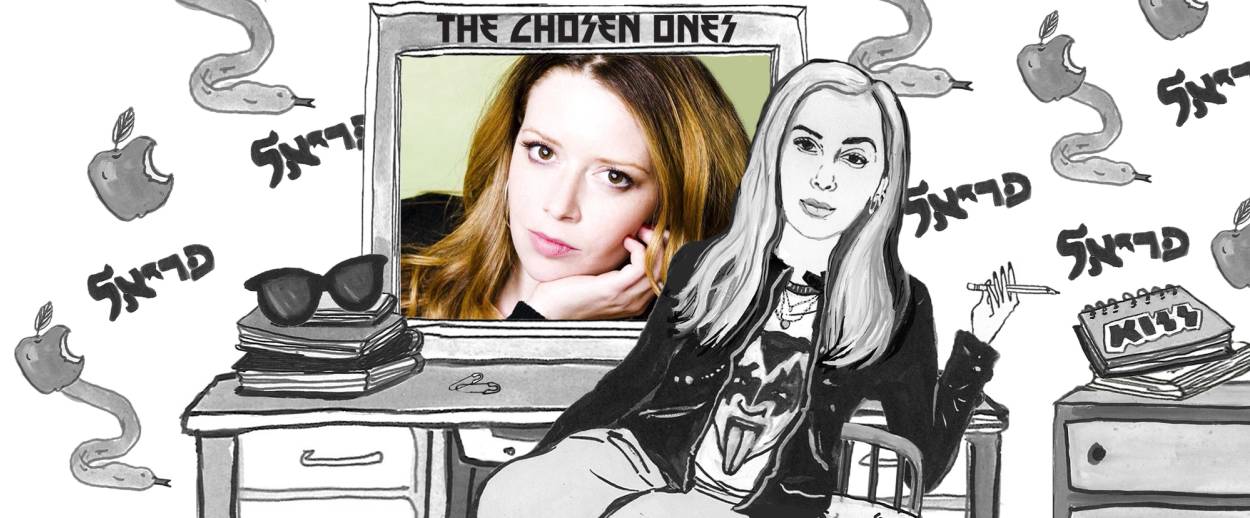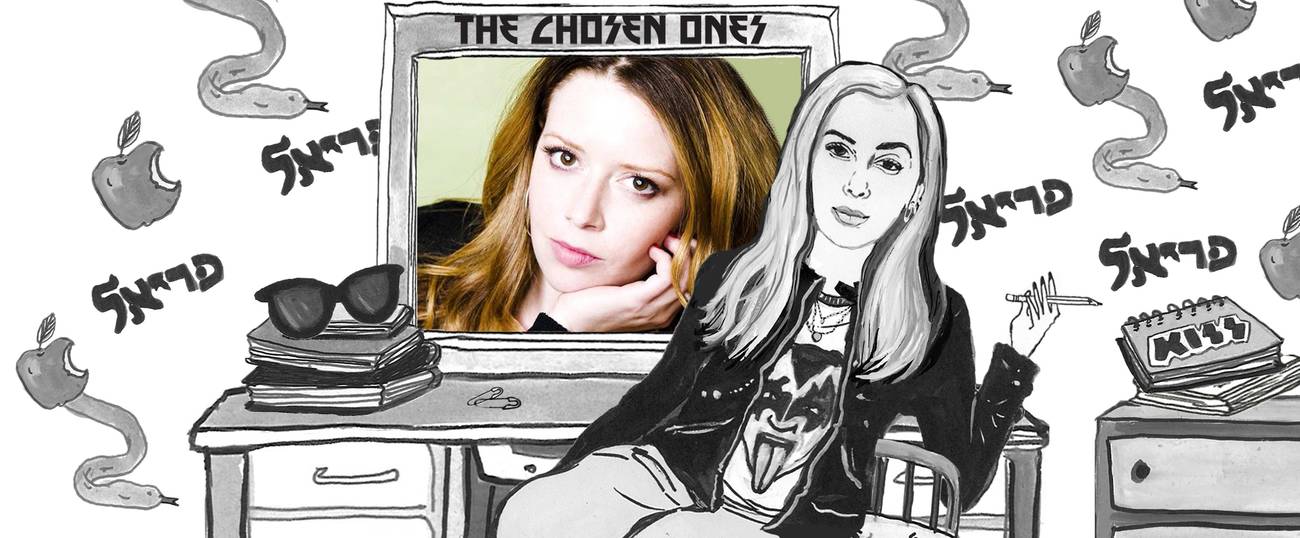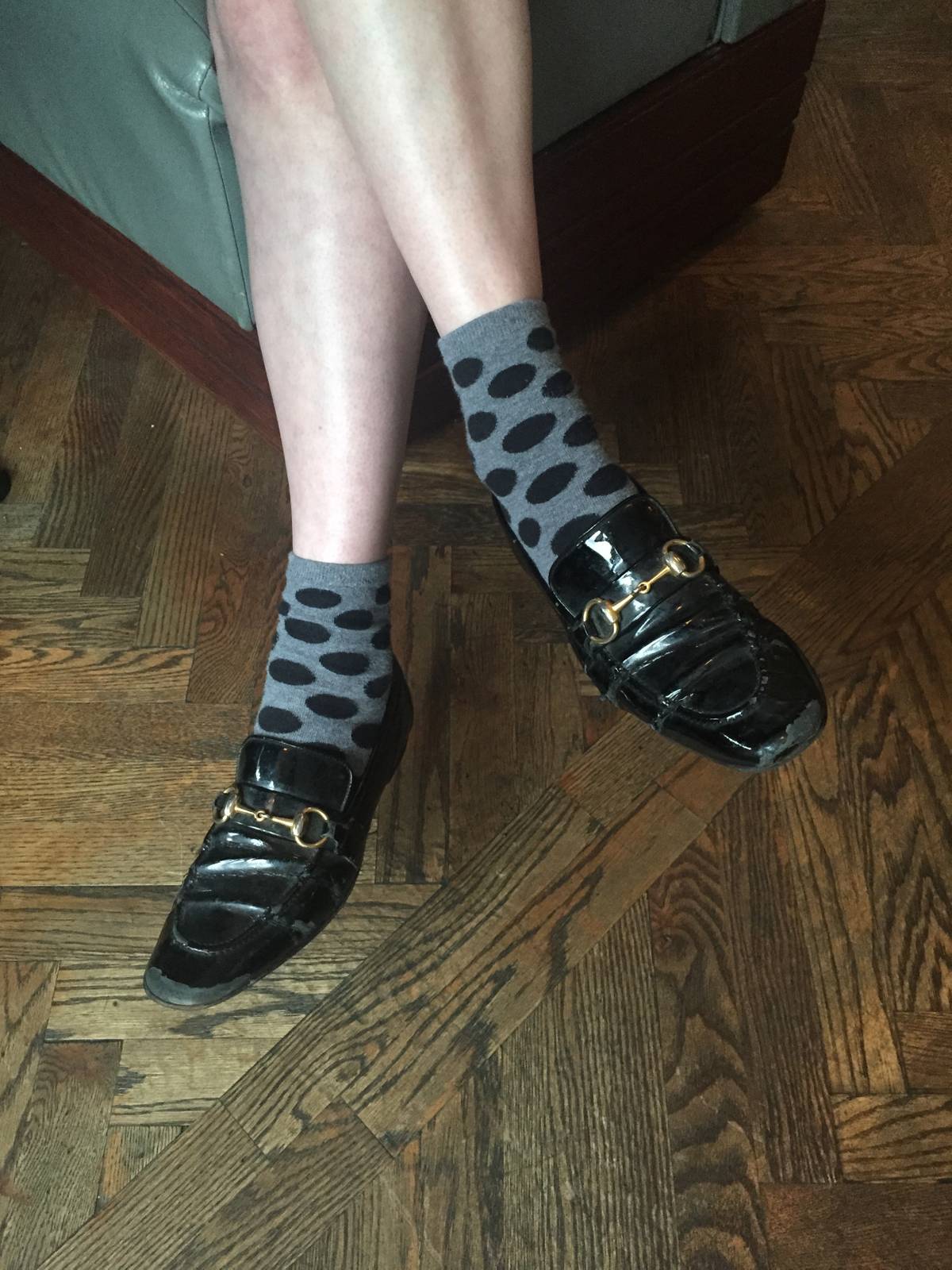The Chosen Ones: An Interview With Natasha Lyonne
The ‘Orange Is the New Black’ actress and Ramaz dropout talks about Yentl, living on sushi and omelets, and what makes her ‘a real blue-chip Ashkenazi Jew’




The Chosen Ones is a weekly column by author and comedian Periel Aschenbrand, who interviews Jews doing fabulous things.
Natasha Lyonne showed up at Russ and Daughters in remarkably good spirits, considering the fact she had just spent a half hour stuck in an elevator. But this is not the story about that.
This is the story of the cover of our Rosh Hashanah print issue, in which Lyonne appears as Yentl, twice, as the gender-bending Jew who would not take no for an answer. In order to appreciate how apropos this is, one has to understand the history of how Yentl came to be. And how it almost didn’t.
Yentl, the film, is based on the short story Yentl: The Yeshiva Boy written by Isaac Bashevis Singer in 1962. What follows is a bastardized and truncated version of its history pilfered in large part from Wikipedia: Barbra Streisand gained the rights in 1969 and was slated to be the star. Singer rewrote his short story for film in 1971 but backed out because he thought both her fame and her age would detract from the film. Streisand tried again in 1973 and this time, her producing partner at the time, Jon Peters, thought she was too old and, wait for it, too feminine.
By 1976, Streisand, who was at the time careening toward old age at 34, was herself convinced that she was too old and decided to only direct, instead. More back and forth over this, that, and the other thing. Hollywood. Studios were backing out for a whole slew of reasons: Streisand was a “novice” director, the film was “not commercial” enough, it was “too ethnic,” etc. Her friends suggested it be reimagined as a musical. The lunacy didn’t end there. In addition to Streisand traveling to Prague with a Super 8 camera and song lyrics, she scouted film locations while simultaneously shooting film of herself walking through the city in costume with early recordings of Yentl’s soundtrack being played in the background. It literally took 20 years to make and the only way she finally convinced her producing partner, who was still Jon Peters, to do it, was to disguise herself as a man, temporarily confusing Peters into thinking that a stranger had broken into the house.
I didn’t know any of this. And before our interview, I didn’t know very much about Natasha Lyonne, either.
Lyonne, although an industry veteran, is, technically, an untrained actress. Raised on the Upper East Side, she was eventually—and probably famously, for our readers—kicked out of Ramaz, where she was on scholarship, for selling weed. Her subsequent history of drug use and addiction is well documented—she got kicked out of Chetz V’Keshet too—as is the string of acting achievements she started piling up: her Emmy Award-nominated role as the heroin addicted, raunchy sex goddess in Orange Is the New Black, her lead in Antibirth opposite Chloe Sevingny, now in theaters, and her starring role in Clea DuVall’s directorial debut, The Intervention.
Natasha is as captivating off-screen as she is on it: screamingly funny, charming, self-deprecating, and sexy as hell. She has no patience for bullshit and she’s as professional as she is talented. Like most people who are brilliant, you can tell within moments of meeting her that she’s also unabashedly complicated. It should come as no surprise, then, that her history to and relationship with Judaism is equally as complex.
Periel Aschenbrand: I don’t know why I thought you were from Brooklyn.
Natasha Lyonne: No, [my family] lived on Long Island for six years and then Israel for two years. And by the time I was 10 we were back in the city full-time.
PA: What was living in Israel like?
NL: It was an idyllic moment in my childhood, because it was the last time my parents were still together.
PA: Why’d you guys move to Israel?
NL: Because of tax evasion.
PA: Really? That sounds scandalous.
NL: It wasn’t, really.
PA: It sounds better if it is.
NL: Well, I’m a real person and there’s a real story.
PA: Fair enough.
NL: I was very precocious.
PA: But you always felt like an outsider?
NL: I’m from Flatbush on my father’s side and Auschwitz on my mother’s side. I’m what they call a real blue-chip Ashkenazi Jew. My mother was born in Paris, raised in Argentina, and eventually wound up in California. My grandmother’s sisters, Bubba and Boochoo, used to go to temple in full Pucci dresses wearing diamonds and pearls. My grandmother used to tell me, “Everyday we have an apple.” But what seemed so promising did not end well by the time I arrived.
PA: How so?
NL: [Ramaz] was an atrocious high school environment. Organized religion was in direct correlation with wealth and status. Rabbi Lookstein was my arch nemesis. I got cast in a Woody Allen film before I got kicked out and then I appeared on Letterman. They were horrible to me but, after Letterman, they asked me to come back.
PA: Did you?
NL: No.
PA: How did that work out?
NL: I’m very educated for a high school dropout. My parents were black sheep but I took being the black sheep to another level.
PA: The idea to engage with Yentl for the cover was your idea. How did you come up with it?
NL: I am in conflict with my heritage and there is an element of integrity to my own, conflicted views. Posing as Yentl seemed like the perfect way to reconcile my complicated feelings about Judaism. But I also feel very connected to it—Bugsy Siegel, Lenny Bruce, Larry David. Those are Jews I can get behind.
PA: What’s your favorite drink?
NL: Black coffee, water, sugar-free Red Bull.
PA: How do you eat your eggs?
NL: Scrambled. I live on omelets and sushi.
PA: How do you drink your coffee?
NL: Black.

PA: What’s your favorite Jewish Holiday?
NL: Yom Kippur, because it’s the most fun.
PA: Of course it is. What shampoo do you use?
NL: Nothing consistent.
PA: Gefilte fish or lox?
NL: Lox. Gefilte fish is how you know you’re at Grandma’s.
PA: Favorite pair of shoes?
NL: These men’s Gucci loafers I got at a thrift store.
PA: Five things in your bag right now?
NL: Let’s find out. Sol Moscot glasses. Cash, $10. AmEx Gold. Cigarettes. More cash—$20! Nicorette. Half a charger. An eyelash curler. Mascara. That’s more than five.
PA: Almost double your limit. I’d expect nothing less.
Periel Aschenbrand, a comedian at heart, is the author of On My Kneesand The Only Bush I Trust Is My Own.